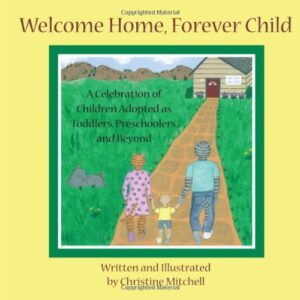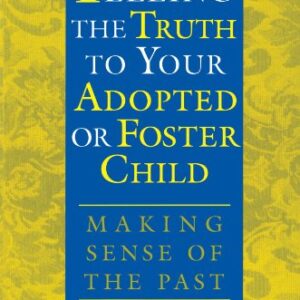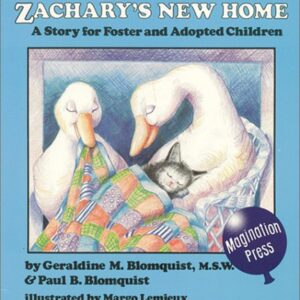Adoption Awareness: Handling Awkward Adoption Questions and Comments
Text and Illustrations by Christine Mitchell, Written for and Published by Tapestry Books
Adoption Questions and Comments are Virtually Inevitable
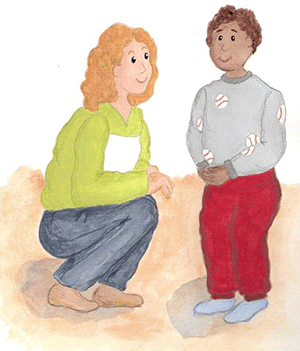
Five-year old Ryan was inconsolable after his cousin, Marissa, exclaimed that his mother wasn’t his real mom because he had been adopted. Ryan’s mother, Natalie, explained to Marissa and Ryan that she is his real mom, because she is the one raising him. Nevertheless, Natalie noticed that her son was hostile to her over the next few days, and she felt sure it was connected to Marissa’s comment. She decided to talk with Ryan about how he was feeling.
When Camilla’s friend, Trevor, asked why she had been adopted, she didn’t feel like sharing the details of her own adoption story. Instead she explained, “Most kids are adopted because their birth parents can’t take care of a child, so they are adopted by family who can.” Camilla later related this incident to her father. He was glad that the family had always discussed adoption in an open and positive manner, and that they had prepared her for questions like this.
Kalisha was excited to be ‘Superstar of the Week’ at school. She asked her mom, Sharon, if it was okay to write “I was adopted” on her Superstar poster. “That’s fine honey”, said Sharon. “Just keep in mind that it might bring up some questions.” Smiling, Kalisha responded, “I don’t care; I tell my friends I’m adopted. You can tell anyone you want that I was adopted.”
Sharon was happy that Kalisha felt proud about her adoption. The two of them then discussed which information Kalisha would feel comfortable sharing, and what she might like to keep private.
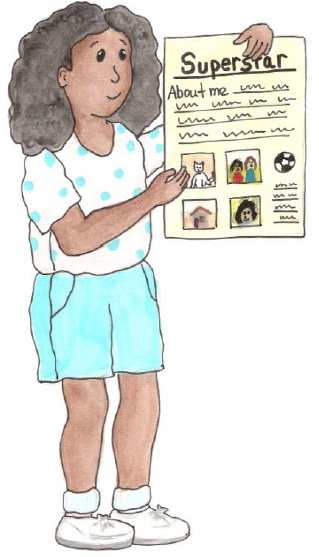
Starting a Dialogue
Most adoptive parents have, at one time or another, experienced insensitive comments and intrusive questions regarding adoption: “I can’t imagine how anyone could give her away!” “Do you have any children of your own?” “What do you know about his real mother?” The remarks may come from friends, relatives, or strangers. These exchanges can leave us feeling hurt, defensive, insecure, and even angry. As uncomfortable as these situations are for adults, we can imagine how difficult they are for our children, who may already be experiencing powerful and conflicting emotions about their adoption.
Whether a comment is made in the child’s presence or directly to him, we need to remember that the most critical thing is to reinforce his sense of belonging in the family. Adoptive families are under no obligation to explain their family to anyone else¹.
It is important to be proactive in starting a dialogue with children about this issue, because children often face adoption questions when there is no adult present. Furthermore, a child may be hesitant to tell their mom or dad about an incident, fearing that it will upset the parent. Of course, we cannot shield our children from every painful situation in life; but we can prepare them – and ourselves – to better handle adoption-related comments and questions.
Selective Sharing
Some children are comfortable talking about adoption with classmates or adults, while others would rather not discuss it outside their family. Parents can convey the message that while adoption is not shameful or secret, each person’s adoption story is personal and it is his or her story to tell. There are many ways to respond to questions and comments without sharing private information or personal feelings. Parents can explain this to their child, whose confidence can then be increased by role-playing, and preparing several different possible responses².
For a variety of reasons, it is important to establish a home environment where adoption is talked about openly and as a part of normal every-day conversation. Children should be encouraged to ask questions and share their feelings about adoption, and those feelings should be acknowledged. When a child feels comfortable about adoption, and has the tools to discuss it, she will feel more in control when faced with awkward questions and remarks.
With the number of adoptions increasing each year, more and more people are touched in some way by adoption. However, many individuals remain unfamiliar with how adoption works and with the more current, respectful adoption language that is preferred these days. Given the fact that adopted children often ask their parents about why their ‘real’ mom ‘gave them away’, or declare that the adoptive parents are not their ‘real’ parents, we should not really be surprised when people who are unfamiliar with adoption fall back on those phrases. If it is confusing to the people involved, it seems logical that it might be confusing to ‘outsiders’ as well.
Using These Examples as a Guide
This resource includes an extensive list of potential questions and comments a child might encounter. Presenting every question and possible response would be overwhelming to a child. However, parents can use the examples as a guide in discussing the issue with their son or daughter. The child’s age and adoption story will influence which situations and responses parents choose to explore with them. Additionally, some responses are clearly more appropriate for older children, while the simpler ones may work better for young children.
A sample conversation starter: “You know, sometimes kids who were adopted are asked questions about adoption that make them feel uncomfortable (or sad). For example, some kids get confused about what ‘real’ parents are, and don’t understand that ‘real’ parents are the ones that are raising you. If somebody asks if you know your ‘real’ parents, they actually mean your birth parents. Let’s talk about a couple of ways you could respond to that….”. The parent can then present options and also ask their child for her own ideas.
The four general strategies below provide options that a child (or parent) can use when they do not wish to respond directly to a question or remark. Following these strategies you will find a list of specific questions and comments that adoptive families may encounter. Each example is followed by several potential replies…including sharing part of their own adoption story or information about adoption in general. Often the chosen response will depend on the setting and who is asking the question.
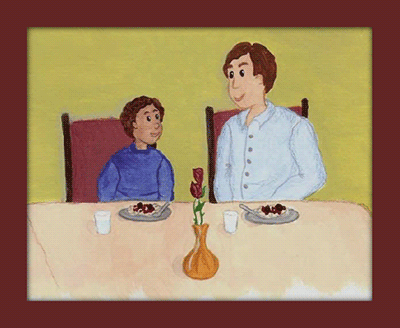
I. Strategies to Deflect or Decline Answering Questions
A. Gain More Time to Decide How to Respond
While it is natural for people to be curious, adopted children should be assured that they do not have to answer every question they are asked. When kids are caught off guard by a question, they can use the following responses to gain more time to think about what they want to say next:
- Why do you want to know?
- Wow. Nobody has ever asked me that before.
- Well, I am kind of surprised you would ask that (or think that).
- That’s an interesting question, but right now I want to play ball, need to finish reading this, etc.
- I’ll let you know if I want to talk about that some time.
- Hmmm, I don’t think that’s right.
B. DECLINE TO ANSWER THE QUESTION
Here are some polite, but direct, responses to decline answering a question:
- That’s kind of personal.
- That’s part of my adoption story, which is private.
- I am not comfortable sharing that.
- I don’t feel like talking about that.
- Some things are private, and this is one of those things.
- Not everyone feels comfortable discussing their adoption outside their family.
- I understand that you are curious, but that’s not something I want to discuss.
C. DEFLECT THE QUESTION TO AN ADULT (OR INFORMATIONAL RESOURCE)
Youngsters can also choose to refer the question to an adult or other source of information. This is particularly appropriate for young children who may not feel comfortable saying “That’s personal” or “I don’t want to talk about that”. The child can suggest to the other person:
- Maybe you can ask my mom or dad about that.
- If you want to know more about adoption maybe you can ask a grown-up.
- If you want to learn about adoption there are lots of books at the library.
- You know, there is a lot of information about adoption on the Internet.
D. EXPALIN THAT THE QUESTION OR COMMENT IS HURTFUL
Not all kids will feel comfortable doing this, but another possibility is to let the other party know that the question or comment is insensitive. People are usually not intentionally trying to be hurtful. Here are some statements which will not only educate the other person, but also accomplish the goal of declining to answer an intrusive question.
- You know, that kind of makes me feel sad.
- Wow, that actually sounds kind of hurtful.
- I know you didn’t mean to, but that sounds pretty hurtful to kids who were adopted.
- I’m sure you didn’t mean to, but that question hurts my feelings.
II. THE ‘HUMOROUS RESPONSE’ – AT WHOSE EXPENSE?
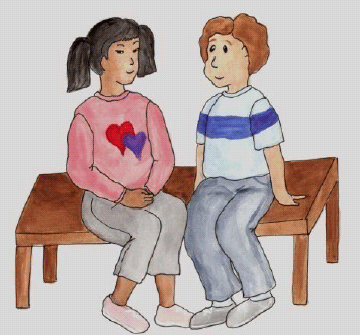
Some resources on this topic suggest the child respond with ‘humor’. Although a few children (and adults) may be able to pull this off in a casual, off-hand manner, for most these replies will sound sarcastic and defensive. Here are some examples of ‘humorous’ responses³:
Question: Why were you adopted?
Why, are you writing a book?
Question: What are you (ethnicity)?
I’m human; what are you?
Question: Where did you come from?
Outer space (or La La Land)
While humorous retorts may sound amusing on paper, they don’t reinforce the concept that each person has the right to keep certain information private (and can state that in a straight-forward manner). If we suggest that our children respond in a way that is dismissive, we are essentially encouraging them to hurt the feelings of another child. As insensitive as the comments or questions may be, they usually stem from curiosity and ignorance rather than intentional ill-will. Nevertheless, they can be painful for adopted children, so we need to prepare our kids for them.
III. Questions Asked of Children
Any of the above strategies can be used with a wide variety of questions and comments. Additional responses are offered below, some of which allow a child to share limited personal information or state something general about adoption. If a question or comment includes the phrase ‘real parents’, the adopted child can clarify that the other person must be referring to his birth parents.
Many of the questions and comments will apply to all types of adoptive families. Some of these questions will be applicable only to certain adoptive families: older child adoptions, transracial adoptions, single parents, same-sex parents, grandparent adoptions, etc.
A. GENERAL ADOPTION QUESTIONS
Question: Why were you adopted?
- Maybe you can ask my parents about that.
- Lots of kids join their families through adoption.
- Because adoption is another way that families are formed (or built).
- Some kids are born into their family and some are adopted into their family.
- Some parents can’t take care of a child, so the child is adopted by parents who can.
- I understand that you’re curious, but that’s not something I want to discuss.
Question: Is that you real mom?
- Yep.
- I’m kind of surprised you would ask that.
- That’s my real mom; she is raising me (I live with her, we have the same last name, etc.).
- I have birth parents and adoptive parents. All of them are real.
- Some kids get confused about that. Real parents are the ones who are raising you. Birth parents are the ones you were born to.
Question: Do you know your real parents?
- You must mean my birth parents. Actually that question is kind of personal.
- Some adopted kids know their birth parents, and some don’t. It is kind of a personal thing.
- I live with my real parents. No, I don’t know my birth parents.
- I live with my real parents. Yes, I remember my birth parents (or I’ve met my birth mom).
Question: Why didn’t your real mom want/keep you?
Children may want to start with “You must mean my birth mom” and then continue:
- When a child is adopted it is usually because their birth parents are not able to take care of any child.
- My birth mom wasn’t able to care for a child. I am wanted very much by my family.
- If you are asking why my birth mom wasn’t ready to be a parent, that is kind of personal.
- You know, that question actually sounds kind of hurtful.
Question: What does it feel like to be adopted?
- It feels normal to me.
- It feels fine.
- That’s kind of a personal question.
- It feels like I have a family that loves me very much.
- If you want to know more about adoption you can ask my parents.
Question: Does it feel strange to be adopted?
- Nope.
- No, because I have an awesome family!
- No. Lots of kids join their family by adoption.
Question: What is your real last name?
- Maybe you can ask my parents about that.
- My real last name is, but my old last name was.
- My last name is. That’s it.
- If you mean my old last name, that’s kind of personal.
Question: Do you miss/think about your birth parents?
- That’s quite a personal question.
- I’m not really comfortable talking about that.
- I think about lots of people that I care about.
- Sometimes.
- Yes, I do.
- I’ll let you know if I want to talk about that some time.
Question: Are you going to look for your real parents?
- Wow. Nobody has ever asked me that before.
- You must mean my birth parents. That’s a very personal question.
- I live with my real parents. The issue of searching for birth parents is private.
- Do you mean my birth parents? I am not really comfortable discussing that.
B. LOOKING DIFFERENT AND TRANSRACIAL ADOPTION QUESTIONS
Question: Why don’t you look like your mother/father/sister/brother?
- That’s kind of a personal question.
- Some things are private, and this is one of those things.
- People in families don’t always look alike.
- Because I was adopted and I have different birth parents then my sister.
Question: You and your parents/sister/brother don’t look anything alike.
- You’re right.
- That’s because I was adopted (or we were adopted).
- Lots of people say that.⁴
- Yeah, I guess so.
- People in families don’t always look alike.
Question: What are you?
- You’ll need to ask my mom or dad that question.
- Do you mean what ethnicity? I am kind of a mix, like a lot of people
these days. - Do you mean what ethnicity? I have relatives (biological or adopted) who are from ________ and ________.
- My birth parents are ________ and my parents are ________ (race or culture).
- I don’t really feel like talking about that.
Question: Is your dad/mom Asian, Black, Hispanic, etc.?
- Why do you want to know?
- That’s kind of a personal question.
- Yes/No.
- No. My birth dad is ________.
- Most people these days are a mix of different backgrounds.
Question: Where did you get those brown eyes/curls/freckles?
- I was born with them (said with a smile).
- They were gifts from God.
- From my birth parents.
- Those traits are genetic, and it can be kind of personal.
- Isn’t it interesting how we all inherit traits from various relatives?
Question: Where are you from?
- I was born in _______ and I have lived here since I was ________.
- I have lived here for ________ years (or as long as I can remember).
- I lived in _________ before I came here.
- I have relatives in __________ if that’s what you mean.
- I’m an American, like you.
C. OLDER CHILD< SINGLE PARENT, SAME-SEX COUPLE AND GRANDPARENT ADOPTION QUESTIONS
Question: Did you live in an orphanage/foster home? (older child adoptions)
- That’s a very personal question.
- Maybe you can talk to my mom/dad about that.
- No, I have always lived with my parents.
- Yes, and I am sure glad I’m with my family now.
- Some kids have lived in an orphanage or foster care and some have not, but that is kind of a personal question.
- I’ll let you know if I want to talk about that some time.
Question: Why do you have a new last name? (foster care adoption)
- So it will match my parents’ name.
- That is kind of personal.
- Because my adoption was just finalized.
Question: Why don’t you have a mom/dad? (single parents or same-sex couples)
- That’s kind of personal.
- Some things are private, and this is one of them.
- Everyone has a mother/father, but mine doesn’t live with us.
- I have the best parent(s) in the world, and that’s all that matters.
- I have a birth dad, but I live with my mom.
- Families come in all shapes and sizes.
Question: Why do you have two moms/dads? (same-sex couples)
- Maybe you can ask my dad or papa about that.
- That’s kind of personal.
- I know it’s a little confusing, but I have two parents who love me, just like you do!
- Families come in all shapes and sizes.
Question: Which one is your real mom/dad? (same-sex couples)
- I’d rather you ask my mom or mama that question.
- Both of them!
- Both of your parents are real, and both of mine are too!
- I know it’s a little confusing, but they both are.
Question: Why are your parents so old? (older parent or grandparent adoptions)
- Wow, that question could hurt someone’s feelings.
- That’s kind of a personal question.
- Well, there are all kinds of families, aren’t there?
- Old? I don’t think they are!
- As the saying goes, they’re young at heat!
D. HANDLING ADOPTION MYTHS AND MISCONCEPTIONS
In Talking With Young Children About Adoption, Mary Watkins and Susan Fisher remind us of the cultural prejudice that “…telling our children they are adopted is bringing them bad news.” Both adopted and non-adopted children are exposed to negative stereotypes and misinformation about adoption in popular movies and television programs. Children may pick up the view that adoptive relationships and families are not at ‘real’ or permanent as biological connections.⁵
Children may hear adults discussing the high cost of adoption (some types) and misinterpret this to mean that parents pay for children. It is also a common assumption that adoptees should be enormously grateful to their adoptive parents, while this same level of gratitude is not expected of children toward biological parents.
Question: Do you worry that your ‘real’ parents will come back to get you?
- You must mean my birth parents. That can’t happen because my adoption is final (or was finalized).
- Nope. My Mom and Dad are my parents by law.
- Since my parents adopted me they are my real parents and nobody can take me away.
Question: Did your parents pay a lot of money for you?
- Parents don’t buy kids. The money they pay is for all the legal stuff.
- People don’t buy children. If you mean the adoption fees, that is personal.
- That’s not how it works; parents don’t buy children. The fees are for the work done by social workers and lawyers, just like parents pay the doctor and the hospital when a baby is born.
Question: You’re lucky your parents adopted you. Aren’t you grateful?
- Like most kids, I am happy to have such a great family.
- You and I are both lucky to have families that love us.
- I am no luckier than you are. We both have parents that love us.
Question: My Sister Says All Adopted Kids Are “Messed Up”.
- Wow, that actually sounds pretty hurtful.
- It sounds like your sister is confused.
- She must have heard some inaccurate information.
- I try not to generalize about people. We don’t assume that all tall people are basketball players, right?
IV. Questions Asked of Parents
Although insensitive adoption questions and remarks can be upsetting to parents as well, we should keep a few things in mind:
- When we are asked seemingly hurtful questions about ‘our own’ children or our child’s ‘real’ parents, the problem is really more likely outdated language than intentional insensitivity.
- If we respond to awkward questions with irritation, anger or sarcasm, this can be as distressing to our child as the original question. The child may perceive this to mean there is something about her or her adoption that is shameful or upsetting to the parent.⁷
- When parents handle insensitive comments or questions gracefully and respectfully, they are modeling appropriate responses for their children.⁸
A. REFERENCES TO ‘YOUR OWN KIDS’, ‘REAL KIDS’, ETC.
Question: Which ones are yours? or Which ones are your real kids?
- They’re all mine; we’re an adoptive family.
- Do you mean which are biological? I’ve lost track (said with a smile).
- They are all my real kids; aren’t I lucky?
- You must mean biological. That is not something care to discuss.
Question: Do you have any of your own?
- Just these!
- Yep, these kids are my own (said with a smile).
- We’ve got three of our own kids, through both birth and adoption.
Question: Are you babysitting?
- No, they’re all mine!
- No, __________ just joined our family.
- No, we’ve been blessed with children through both birth and adoption.
Question: Is your son adopted?
- Yes, we adopted each other!
- Yes, and we are so thrilled to have him as our son!
- I can understand your curiosity, but that is a rather personal question.
B. QUESTIONS ABOUT BIRTH FAMILY HISTORY
Question: Did his parents die, or did they just not want him?
- His birth parents were unable to care for him safely and he needed a family who could.
- Children are usually adopted (or in foster care prior to adoption) because their birth parents are unable to care for them.
Question: What do you know about his real parents?
- You must mean his birth parents. Actually that is kind of personal.
- His birth parents? That is part of his adoption story, which is his story to share if he likes when he is older.
Question: Did her birth parents use drugs?
- Actually, we don’t share information about her birth family.
Question: Was he abused?
- Actually, we don’t share information about his background and birth family.
Question: Where did you get him?
- He was born in _________. He joined our family last year and _________ (bio child) was born here in _________.
C. QUESTIONS BASED ON MISCONCEPTIONS AND JUDGMENTS
Question: Now that you’ve adopted you’ll get pregnant.
- I don’t think that’s how it works, and that was not our reason to adopt.
- Of course we will gladly welcome children however they join our family. Right now we are focused on _________.
Question: Didn’t you want a baby (rather than an older child)? or Didn’t you want one of your own?
- We wanted a child to love, and she fits our family just right.
Question: Is there a trial period? If it doesn’t work out can you send her back?
- That’s not how it works. Although adoptions occasionally disrupt, adoption is meant to be a lifelong commitment to a child who will be a permanent part of the family.
- We don’t view it that way. Just as there is not a trial period for a child born into a family.
Question: I could never love/raise someone else’s child.
- Well, adoption is not right for everyone. It was right for us.
- Well then adoption isn’t for you, but it is right for our family.
Question: Why would you want to take on somebody else’s problems?
- I don’t view adoption that way. I see it as a wonderful way to build our family.
- He joined our family through adoption. He is originally from ______________.
Question: Aren’t you worried he’ll have all kinds of problems?
- All parents want the best for their child, and they do what is needed to help their child when problems arise.
Question: How could any mother give up such an adorable baby?
- It is a very difficult choice, but birthmothers generally make an adoption plan because they were not able to care for any child.
Question: Why did you adopt overseas when there are so many kids here?
- Every family has to do what is right for them.
Question: Why did you adopt from foster care when you can get a baby overseas?
- Every family has to do what is right for them.
Question: Why did decide to adopt?
- Because we wanted to be parents (or love being parents).
- Because we wanted a child and adoption was right for us.
- Because we think adoption is a wonderful way to build a family.
If you’re interested in adoption (or adopting), give me a call and I can refer you to some good resources.
V. Additional Considerations
Adoption is a complex issue, even in the case of domestic newborn adoptions. It can get further complicated with international, transracial, kinship, older child and sibling group adoptions. Many adoptive families have to deal with society’s assumption that family members should look alike. Some families are delicately blending both biological and adopted children. And adopted children often find themselves the targets of teasing and bullying. Unfortunately, the Internet, cell phones, and other technology have brought bullying to a whole new level (Cyberbullying). These issues can bring additional challenges, as discussed below.
A. TRANSRACIAL ADOPTIVE FAMILIES
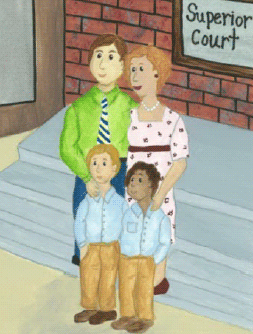
Most people in the adoption community recognize the importance of providing adopted children with knowledge of, and exposure to, their culture. One role of the adoptive parent is to help their child develop pride in their racial and ethnic heritage. At the same time, children may not care to explain their ethnic background to anyone and everyone who happens to be curious.
As explained by adoption expert and author Regina M. Kupecky, “Kids in interracial adoptive families are often asked, ‘Is that your mother?’ When adoption is visible to the eye kids say adoption is always there; they feel like they never go out without people staring.”⁹ Depending on the situation, an adopted child may wish to share information about their adoption and ethnic heritage or may prefer to say, “That’s personal”.
Unfortunately, we know that ethnic minorities are sometimes targets of racism and prejudice. Transracially adopted children and their families confront this with disturbing regularity. While racism is hard on any child, transracial adoptees often have the added challenge of not having parents who can personally relate to the experience. Parents who have not encountered racism themselves will want to pay extra attention to helping their children find appropriate ways to respond to it.
Racism and discrimination are complex issues that warrant a deeper discussion than is possible in this resource. However, a few responses to blatant racism are presented below.
- I don’t agree with you.
- It makes me sad to hear you say that.
- I think you’re confused about that.
- I am very surprised that you would think that.
- That’s not true. Please don’t say it again.
- That bothers me. Please don’t say it again.
- I find that statement offensive.
B. SIBLING RIVALRY AND HURTFUL ADOPTION REMARKS
Sometimes the hurtful comment comes from the adopted child’s own sibling: “You’re not my real brother! I wish we never adopted you!” In some instances this is a result normal sibling rivalry. Other times it might be because the adopted child is acting out excessively toward the sibling, due to their own grief and anxiety (especially children adopted beyond infancy).
In Understanding Sibling Rivalry: The Brazelton Way, Dr. T. Berry Brazelton and Dr. Joshua D. Sparrow advise adoptive parents to help the sibling understand the adopted child’s behavior. They might explain that he acts out because he misses his birth family, or gets frightened when he thinks about scary things that happened before he was adopted. By accepting the non-adopted child’s feelings and frustrations, parents will themselves be modeling tolerance.¹º With that said, it must be made clear that language such as “You’re not my real brother” is very hurtful and will not be tolerated.
C. TEASING AND BULLYING
Parents should advise their kids to be selective about which personal information they share, and with whom. Children (and adults) are not always tolerant of people they perceive as ‘different’. For this reason, by the middle school years, many kids do not even want others to know they were adopted.¹¹ Especially as kids get older, school bullies may tease adopted kids. The more personal details the bully knows, the more ammunition they may have to harass a child. For example, a child who has shared information about a birth parent’s drug use or incarceration may find that it is later used against him. Similarly, adoptive parents who confide personal details to friends while their child is young may end up regretting it as the years go by. Once the information is out there, it can’t be ‘taken back’.
Parents can also discuss with their children the difference between secrecy and privacy. Adoption is not secret or shameful. While adoption inherently involves loss and grief, it can be a wonderful way to build a family. However, the individual details and circumstances of adoption are generally private in the same way that other family information in not shared outside of the family. When a child is teased at school, here are some possible replies:
When a young child is teased about being adopted, it may be because the non-adopted child is worried whether losing one’s biological parents is something that could happen to her. Teasing can even be an attempt on the part of the other child to distance herself: "she’s ‘different’..that couldn’t happen to me".¹³
It might be helpful to explain this to the adopted child, and also let him know that children who tease often do so because they don’t feel good about themselves. Parents can remind their child that (unfortunately) kids are teased about all kinds of things, including being chubby or tall, wearing glasses, having freckles, and even being ‘too smart’.¹⁴ A group of adopted teens who meet monthly in Portland, Maine had this advice for adoptive parents:
“Teach kids to stick up for themselves. People will say mean things, show your kids how they should handle it.”
"Regarding teasing: validate, validate, validate! Don’t say ‘I’m sure he didn’t mean it.’ Don’t try to fix it. Say, ‘That stinks!’"¹⁵
D. CYBERBULLYING
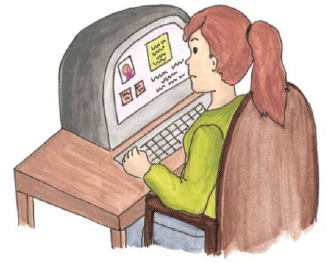
When Gabby’s parents noticed that she had been acting withdrawn, the 15 year-old finally revealed that a classmate had been sending her hurtful text messages and e-mail’s, and copying them to other students as well. The messages were very mean-spirited, saying that Gabby’s ‘real’ parents didn’t want her and that they were drug addicts.
Gabby’s parents did not know the other parents, so they contacted the girls’ homeroom teacher. He agreed to mediate a meeting between both girls and their parents. Gabby shared how she had been affected by the derogatory messages, and the other girl acknowledged that her behavior had been cruel. Ultimately, she apologized to Gabby and agreed to stop the bullying.
These days teasing and bullying have moved far beyond school-yard taunts and prank phone calls. Cyberbullying is a form of social aggression that is conducted by sending or posting hurtful material through technology including e-mail’s, cell phone calls, text and instant messages, and posts on social networks like MySpace.
This type of bullying is particularly insidious because it is often anonymous and unrelenting. There may be more than one aggressor involved, and the material can be widely distributed. The intention is to embarrass the victim and damage his reputation. Of course, victims can be harassed about any number of ways they are seen as ‘different’, including their adoptive status.
Parents should discuss the issue of cyberbullying with their ‘tweens’ and teenagers, urging their children to inform them if they are bullied. If parents discover their child has been bullied about being adopted, or anything else, a good starting point is to identify and talk about the child’s feelings. Together parents and the child can then discuss the best approach:
- Confront the other party directly, and demand that the harassment stop.
- Contact the aggressor’s parents, and forward the offensive material to them.
- Approach a teacher to arrange mediation involving the children and parents.
- Parents may consider limiting the time their child spends online, text messaging, and IMing.¹⁶
In Cyber-Savvy Teens, Nancy E. Willard advises teens not to retaliate; this can make the victim look like they are part of the problem and may even escalate the harassment. She encourages teenagers to save the evidence and get an adult involved. In extreme cases legal action may be necessary, and if the cyberbullying contains threats it should be reported to the police.¹⁷ This excellent resource also addresses the issues of protecting online privacy, avoiding adult content, online predators, scams and much more. Cyberbullying is a very complex problem with seemingly endless variations on how it can be accomplished. It is addressed briefly here, but additional resources are listed at the end of this guide.
Conclusion
Adoptive families experience both great joys and unique challenges. Handling awkward comments and remarks is just one of the many concerns adoptive parents and children face. Through family discussions children can learn how to establish boundaries about how much personal adoption information they are comfortable sharing. Children can also learn how to educate others, if they wish, about adoption in general.
Communicating with others about adoption may even aid children in making sense of it themselves.¹⁸ Additionally, they may learn that other children they know are adopted, which helps them to feel less ‘alone’ in their adoptive status and feel more like a part of a community.
As parents, we can set a good example when we are faced with these situations by responding in a respectful manner. We can display pride in being an adoptive family and pride in our children. Our goal should be protect our child’s privacy while reinforcing that adoption is one way to build ‘real’ families with their ‘own’ children.¹⁹ Hopefully the suggestions and examples in this guide will help parents and their children discuss the issue and become better prepared when they face curiosity and unsolicited opinions about adoption.
Bibliography
¹ "Relatives Say the Strangest Things: Is your extended family less than savvy about adoption? Here’s how to handle it". Leonard Felder, PhD, www.adoptivefamilies.com/articles.php?aid=746
² “Being Adopted”, Marlou Russell, PhD, 2002, http://www.adopting.org/
³ "Adoption Talk, Annoying Questions/Quick Comebacks", www.adoptionclubhouse.org
⁴ "Being Adopted", Marlou Russell, PhD, 2002, www.adoptiong.org
⁵ Talking to Young Children About Adoption, Mary Watkins and Susan Fisher, 1995, Yale University Press
⁶ "Real Parents: Teaching this Equation at School and at Home", Deborah McCurdy, MSW, http://foreverparents.com/
⁷ "Gracious Answers to Awkward Questions About Our Adopted Kids", Deborah McCurdy, MSW, http://library.adoption.com
⁸ Talking to Young Children About Adoption, Mary Watkins and Susan Fisher, 1995, Yale University Press
⁹ Personal Interview with Regina Kupecky, LSW, Co-therapist at Attachment and Bonding Center of Ohio, co-author with Gregory C.Keck, PhD: Adopting the Hurt Child and Parenting the Hurt Child.
¹º Understanding Sibling Rivalry: The Brazelton Way, Dr. T. Berry Brazelton and Dr. Joshua D. Sparrow, Da Capo Press, 2005.
¹¹ Personal Interview with Regina Kupecky LSW, Co-therapist at Attachment and Bonding Center of Ohio, co-author of Adopting the Hurt Child and Parenting the Hurt Child.
¹² "101 Comeback Lines", http://www.bullystoppers.com/
¹³ Parent Guidebook for the W.I.S.E. Up! POWERBOOK, Marilyn Schoettle, M.A., 2000, The Center for Adoption Support and Education, Inc. (C.A.S.E.).
¹⁴ "Explaining Adoption to a School-Aged Child", http://life.familyeducation.com. The article sites The Complete Idiot’s Guide to Adoption, Christine Adamec, 2004.
¹⁵ "Adopted Teens Share Advice", Tess Nacelewicz, Portland Press Herald, May 13, 2007, http://pressherald.mainetoday.com/news/local/070513adoptedteens.html
¹⁶ "From the Experts - Beyond Sticks and Stones: Dealing with Severe Cyberbullying", by Julie Guido (Therapist), htt://bnetsavvy.com/ht/display/ContentDetasils/i/535 www://bnestsavvy.com/ht/display/ContentDetails/i/535
¹⁷ "Cyber-Savvy Teens: Making Safe and Responsible Choices Online", Nancy Willard, 2007, www.cyber-safe –kids.com
¹⁸ Talking to Young Children About Adoption, Mary Watkins and Susan Fisher, 1995, Yale University Press
¹⁹ "Gracious Answers to Awkward Questions About Our Adopted Kids", Deborah McCurdy, MSW, http://library.adoption.com
Additional Resources
- http://www.stopcyberbullying.org
- http://www.cyberbullying.us/
- “Educator’s Guide to Cyberbullying and Cyberthreats”, Nancy Willard, M.S., J.D.
- Center for Safe and Responsible Use of the Internet
- http://transracial.adoption.com/


